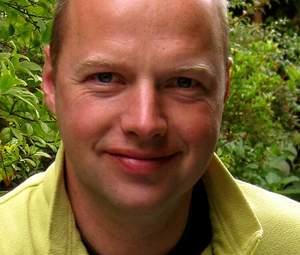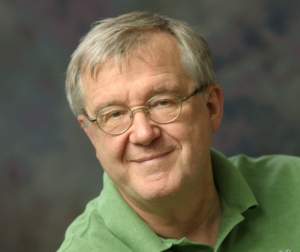SANTA CLARA, CA--(Marketwire - August 26, 2010) - NVIDIA today announced that two of the world's leading computing visionaries will join NVIDIA CEO and co-founder Jen-Hsun Huang as keynote speakers at the second annual GPU Technology Conference (GTC).
Klaus Schulten of the University of Illinois at Urbana-Champaign, one of the world's top computational biologists, will deliver the second keynote on Wednesday, Sept. 22, highlighting the major discoveries made using the computational microscope. In addition, he will review his pioneering research on cell disruption and viruses, including the H1N1 virus. His H1N1 research uses the GPU-based computational microscope to focus on the structure of the virus, determine how it reacts to drug treatment and investigate possible methods of combating it.
Sebastian Thrun, a robotics pioneer at Stanford University and distinguished engineer at Google, will conclude the conference with his keynote on Thursday, Sept. 23, unveiling how advances in GPU computing for computer vision will fundamentally advance self-driving, robotic technology for cars.
Building on the tremendous success of the inaugural event in 2009, GTC 2010 will again focus on how developers, engineers and researchers are using the power of graphics processing units (GPUs) to solve the world's most important computing challenges.
GTC 2010 will take place from Monday, Sept. 20, to Thursday, Sept. 23, at the San Jose Convention Center in San Jose, Calif. Registration for GTC 2010 is now open. Interested attendees can register and find detailed information about conference keynotes, sessions, tutorials, and roundtables at www.nvidia.com/gtc.
"In the year since the last GPU Technology Conference, industry, research and academic leaders have continued to identify new and revolutionary ways to harness the power of GPUs," said Bill Dally, chief scientist at NVIDIA. "Conference attendees will be astounded by the tremendous advances in GPU computing, and we are delighted that professor Schulten and professor Thrun will be sharing their unique findings and experiences about the game-changing impact of GPU technology in their respective fields."
Background on the keynote speakers is below:
Klaus Schulten is a full-time faculty member at the Beckman Institute for Advanced Science and Technology and Swanlund professor of physics at the University of Illinois, and directs the university's Theoretical and Computational Biophysics Group. He has received numerous awards and honors including: Award in Computational Biology (2008); Humboldt Award of the German Humboldt Foundation (2004); University of Illinois Scholar (1996); Fellow of the American Physical Society (1993); and Nernst Prize of the Physical Chemistry Society of Germany (1981). He received his Ph.D. from Harvard University in 1974.
Sebastian Thrun is a professor of computer science and electrical engineering at Stanford University, where he directs the Stanford Artificial Intelligence Lab. He is also a distinguished engineer at Google. Thrun's team won the DARPA Grand Challenge, a U.S.-Government sponsored autonomous robot race in 2005. He pioneered the field of probabilistic robotics and co-invented Google Street View. He was elected into the U.S. National Academy of Engineering and the German Academy of Sciences, is an elected fellow of the AAAI, ECCAI, and WTN. Popular Science included him in its "Brilliant Ten," Forbes in its "E-Gang," Scientific American in its list of 50 world technology and policy leaders, and Fortune selected him as one of the 50 smartest people in tech. In addition, WIRED awarded Thrun's robot, Stanley, the top spot in the most influential robots of all times. Thrun has authored 11 books and over 300 scientific articles. He received his Ph.D. from University of Bonn.
Jen-Hsun Huang co-founded NVIDIA in 1993 and has served since its inception as president, chief executive officer and a member of the board of directors.
The GPU Technology Conference is sponsored by Adobe, HP, Microsoft, Dell, Supermicro, PNY, Cooley, TSMC, Synnex, Samsung, NextIO, GE Intelligent Platforms, Acer, AMAX, SGI, Appro, Sutter Hill Ventures, Hynix, Citi, Dassault Systemes, Silicon Valley Bank, and Deloitte.
Tags / Keywords:
NVIDIA, GTC, GPU, supercomputing, parallel computing, CUDA, GPGPU, Tesla, Quadro, high performance computing, visual computing, developers, bioscience, oil & gas, medical, finance
About NVIDIA
NVIDIA (
Certain statements in this press release including, but not limited to, statements as to: the impact of GPU technology; the impact of the company's products, technologies and expertise on visual computing and parallel processing; and the impact of the company's patents on modern computing; are forward-looking statements that are subject to risks and uncertainties that could cause results to be materially different than expectations. Important factors that could cause actual results to differ materially include: our reliance on third parties to manufacture, assemble, package and test our products; global economic conditions; development of faster or more efficient technology; the impact of technological development and competition; design, manufacturing or software defects; changes in consumer preferences or demands; changes in industry standards and interfaces; unexpected loss of performance of our products or technologies when integrated into systems; as well as other factors detailed from time to time in the reports NVIDIA files with the Securities and Exchange Commission, or SEC, including its Form 10-Q for the fiscal period ended May 2, 2010. Copies of reports filed with the SEC are posted on the company's website and are available from NVIDIA without charge. These forward-looking statements are not guarantees of future performance and speak only as of the date hereof, and, except as required by law, NVIDIA disclaims any obligation to update these forward-looking statements to reflect future events or circumstances.
Copyright © 2010. All rights reserved. NVIDIA, the NVIDIA logo, CUDA, Tesla, and Quadro are trademarks or registered trademarks of NVIDIA Corporation in the United States and other countries around the world. Other company and product names may be trademarks of the respective companies with which they are associated. Features, pricing, availability, and specifications are subject to change without notice
Contact Information:
For more information, contact:
George Millington
NVIDIA Corporation
(408) 562-7226
gmillington@nvidia.com

